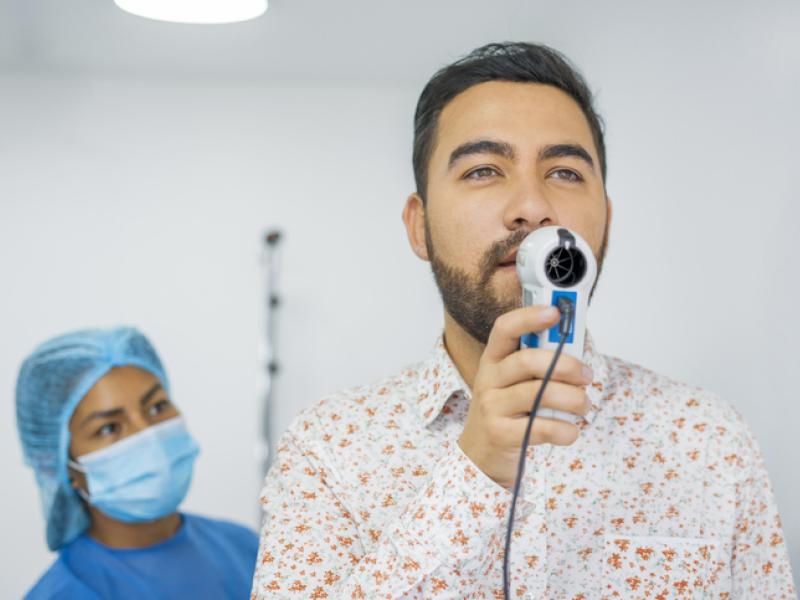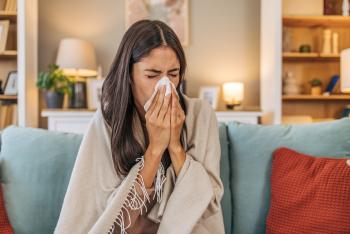Emphysema, a progressive form of chronic obstructive pulmonary disease (COPD), can severely limit...
Read More
Understanding your lung function is a vital step in the journey toward optimal respiratory health. PFTs offer precise diagnostics and personalized insights, guiding you toward a life of easier breathing and improved well-being.
Pulmonary function tests (PFTs) are painless, noninvasive breathing tests for understanding and managing your respiratory health. You may undergo a PFT if you experience symptoms like shortness of breath, coughing, or wheezing or if you have a known respiratory condition.
Depending on your condition and symptoms, your doctor may also recommend exercise testing alongside a PFT to evaluate your overall physical performance and cardiovascular health. Together, these evaluations provide a comprehensive assessment of both cardiovascular and respiratory health.
Through precise measurements, PFTs evaluate various aspects of lung function, including the volume of air you can inhale and exhale, the speed of air expulsion, and oxygen transfer efficiency, which measures how effectively oxygen moves from the lungs to the bloodstream. This evaluation helps your doctor diagnose conditions such as asthma, chronic obstructive pulmonary disease (COPD), pulmonary hypertension, and pulmonary fibrosis.
The actual PFT typically begins with spirometry, where you'll breathe into a mouthpiece connected to specialized equipment. You'll perform a series of breathing maneuvers, including deep inhalations and forceful exhalations, with the therapist guiding you through each step. This part of the test usually takes 15 to 30 minutes to complete. Depending on your specific symptoms and medical history, your doctor may order additional PFTs, which may involve different breathing maneuvers and equipment but are painless and noninvasive.
After completing PFTs, they may offer guidance on medication management, proper inhaler techniques, oxygen therapy and lifestyle modifications like quitting smoking to improve your respiratory health. Our dedicated team provides personalized care and support, ensuring you feel informed, valued, and confident in your journey toward optimal respiratory health.

Spirometry measures how much air you can breathe in and how fast you can blow it out. It helps your doctor diagnose conditions like asthma and COPD by assessing how well your lungs work.

This test checks how much air your lungs can hold. It helps your doctor diagnose conditions that make it hard for your lungs to expand fully, like restrictive lung diseases.

A DLCO checks how well oxygen moves from your lungs into your bloodstream. It helps your doctor diagnose conditions like emphysema and pulmonary fibrosis by seeing how efficiently your lungs transfer oxygen.
PFTs are painless and noninvasive, with sessions typically lasting 45 minutes to an hour. Our on-site respiratory therapists ensure you feel relaxed and informed throughout the process.
Our South Jersey offices feature state-of-the-art PFT facilities with advanced technology for a wide range of tests beyond spirometry. Conveniently located within our pulmonary offices, you won't need to visit a hospital for your PFTs.
Our experienced respiratory therapists provide trusted care and support and offer personalized education on medication management, inhaler techniques, oxygen therapy, and insurance navigation. You can feel confident knowing you’re in capable hands.
PFTs are noninvasive, painless procedures. You may experience mild discomfort or shortness of breath during the test, but there is no pain involved. Our experienced respiratory therapists will ensure your comfort throughout the procedure.
Before your PFT, avoid smoking and eating heavy meals. Wear comfortable clothing and inform your respiratory therapist if you're taking any medications that may affect your breathing.
You can drink water to stay hydrated, but avoid heavy meals and caffeine for at least two hours before your PFT to ensure accurate results.
Yes. You'll be instructed to perform various breathing maneuvers, but they are not strenuous and will not cause breathing difficulties.

Emphysema, a progressive form of chronic obstructive pulmonary disease (COPD), can severely limit...
Read More
Mouth taping is a practice that promotes nasal breathing during sleep, which may improve sleep...
Read More
Walking pneumonia is a mild but disruptive form of pneumonia with symptoms like a lingering cough...
Read More